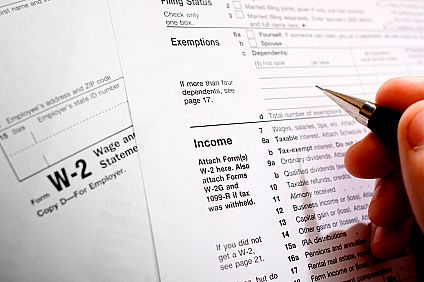By Michael Swartz
This is the time of year most Americans receive their W-2 and 1099 forms, putting into motion the annual process of calculating the maximum amount they can get back from Uncle Sam.
Before April 15, many Americans will devote hours attempting to make sense of the tax laws for that elusive refund while others simply throw up their hands and hire a tax professional to handle their returns. It’s an industry which fetchingly promises their customers the largest tax refund they can get – if only Americans got an actual return on investment when that check arrived from the Department of the Treasury. Few people who receive tax refunds realize they’re simply being paid back the interest-free loan they gave to the federal bureaucracy the previous year.
Over the last decade or so, a few thinkers have attempted to convince Americans there’s a better way. Steve Forbes based two unsuccessful Presidential campaigns in 1996 and 2000 on the concept of a single-rate flat tax with few deductions, while Rep. John Linder of Georgia has spent the past decade introducing a consumption-based solution dubbed the FairTax to each new session of Congress.
While both methods are long on merits and could easily be adjusted to rates assuring sufficient funds for necessary government programs, there’s one element missing from these alternatives which prevents them from getting traction inside the Beltway or in any state capital.
America’s complex tax code allows Washington to control behavior through reward or punishment. In his recent State of the Union address, President Obama noted, “We cut taxes. We cut taxes for 95 percent of working families…We cut taxes for first-time homebuyers. We cut taxes for parents trying to care for their children. We cut taxes for 8 million Americans paying for college.”
Most readers would nod their head in agreement because these are behaviors, which tend to lead to productive lives. But if you become too productive by earning too much money, suddenly you’re a target. And a favorite weapon of Washington insiders is pegging these tax breaks to income, phasing them out if your family’s take-home pay starts to creep over a certain threshold considered “fair” by those in charge. President Obama campaigned on “sharing the wealth,” and if you happen to be someone who makes over $250,000 he considers your wealth his to share.
Yet figures compiled by the Heritage Foundation tell a different tale, noting that the top fifth of income earners saw their share of taxation increase from 81.2% in 2000 to 86.3% in 2006 – on only 55.7% of total income. Even under the Bush tax cuts panned by Democrats as “tax cuts for the rich” the high-income earners as a whole shared far more than they made. While either of the proposed alternative methods of taxation would still come down harder on those who make large salaries, they wouldn’t tend to single producers out for punishment.
This fairer, flatter approach to taxation, though, flies in the face of a governmental philosophy that exists to redistribute wealth and thousands of lobbyists who make their living pitching new regulations and tax code designed to benefit those who stroke their checks at the expense of business competitors or political opponents. These are the people who are perfectly happy to maintain a complicated, unfair system where its sheer complexity bullies taxpayers into not taking every allowable deduction and where errant filers are guilty until proven innocent.
It’s a system long overdue for fundamental change, and soon we’ll have the opportunity to elect politicians with the spine to undertake it.
Michael Swartz, an architect and writer who lives in rural Maryland, is a Liberty Features Syndicated writer for Americans for Limited Government.


